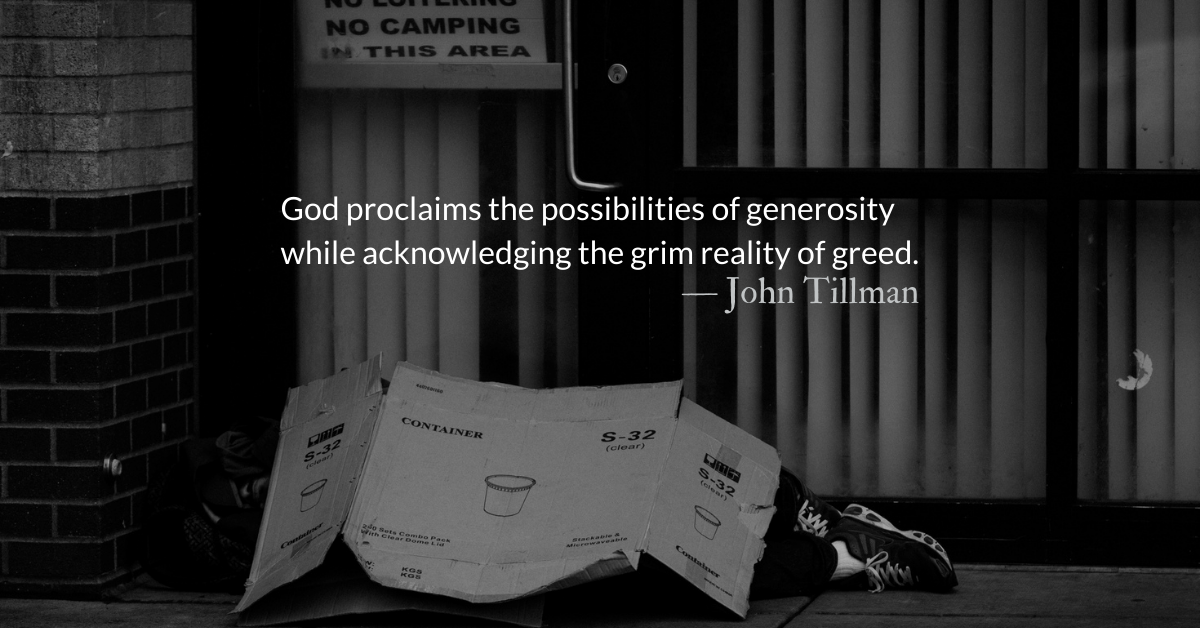Scripture Focus: Deuteronomy 15.4-5, 7-11
4 …there need be no poor people among you, for in the land the Lord your God is giving you to possess as your inheritance, he will richly bless you, 5 if only you fully obey the Lord your God …
7 If anyone is poor among your fellow Israelites in any of the towns of the land the Lord your God is giving you, do not be hardhearted or tightfisted toward them. 8 Rather, be openhanded and freely lend them whatever they need. 9 Be careful not to harbor this wicked thought: “The seventh year, the year for canceling debts, is near,” so that you do not show ill will toward the needy among your fellow Israelites and give them nothing. They may then appeal to the Lord against you, and you will be found guilty of sin. 10 Give generously to them and do so without a grudging heart; then because of this the Lord your God will bless you in all your work and in everything you put your hand to. 11 There will always be poor people in the land. Therefore I command you to be openhanded toward your fellow Israelites who are poor and needy in your land.
Matthew 26.11
11 The poor you will always have with you, but you will not always have me.
Reflection: Deuteronomy’s Dream for the Poor
By John Tillman
Matthew 26.11 is just one phrase of many words of Jesus that have been misquoted, taken out of context, or abused in history. People have used this to imply that poverty is intractable and action against it is ineffectual at best and against God’s will at worst. This false teaching is one of the more damaging ones to spread in the history of the church.
Jesus never implied opposing poverty means opposing God’s sovereignty. Instead, Jesus directly referenced Deuteronomy 15.11, including its command to be openhanded toward the poor.
Deuteronomy makes an extraordinary promise that “there need be no poor people among you” (Deuteronomy 15.4) but follows it up with realism, saying, “There will always be poor people…” (Deuteronomy 15.11)
God proclaims the possibilities of generosity while acknowledging the grim reality of greed. Through following God, we can open our hearts and hands, maintaining idealistic visions and actions without losing sight of ugly realities. Christians can look the darkest realities of poverty in the face and confidently say, “It doesn’t have to be this way.”
“If only you fully obey the Lord your God.” (Deuteronomy 15.4)
The dream of Deuteronomy 15.4 was fulfilled (for a short time) in the early church. It was said of them, “God’s grace was so powerfully at work in them all that there were no needy persons among them.” (Acts 4.33-34) These Spirit-filled believers fulfilled Deuteronomy’s proclaimed possibility about the poor.
All systems controlled by humans eventually become corrupted and the Acts 4 church is no exception. Racism slips into the distribution of food and the highest levels of the church leadership must get involved (and get honest) to solve it. Corruption in systems run by humans is inevitable. If the church’s own system faced accusations of inequity, how much more can we expect inequity to be a concern in secular systems? However, these concerns are not a reason that we should abandon our calling in this area.
At the heart level of each individual and at the highest levels of our churches, denominations, and governments, Christians must acknowledge that the poor are our responsibility and are one way that God will judge how well we are helping his will to be done “on Earth as it is in Heaven.” (Matthew 6.9-10)
Divine Hours Prayer: The Refrain for the Morning Lessons
Let not those who hope in you be put to shame through me, Lord God of hosts; let not those who seek you be disgraced because of me. — Psalm 69.6
– Divine Hours prayers from The Divine Hours: Prayers for Springtime by Phyllis Tickle
Today’s Readings
Deuteronomy 15 (Listen – 3:20)
Psalm 102 (Listen – 2:45)
Read more about Spiritual Indicators
God holds his people responsible for the welfare of the poor, the foreigners, the widows, and the orphans.
https://theparkforum.org/843-acres/spiritual-indicators
Read more about He Became Poor
The reasons God gives for his just acts of judgment against Israel and Judah…always include offenses related to oppression of the poor.







